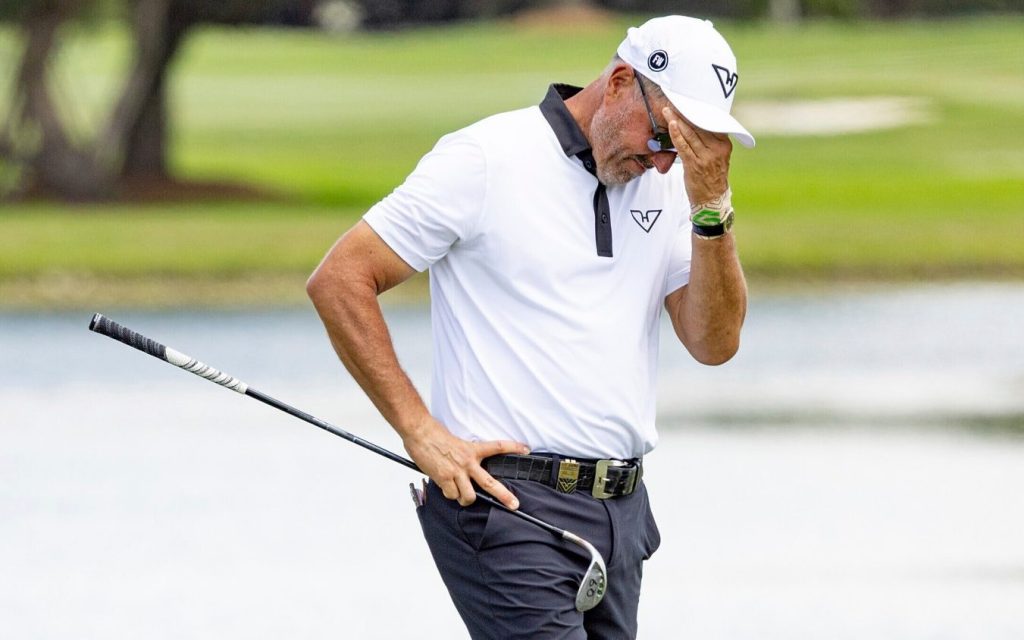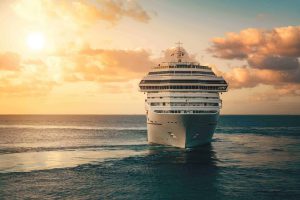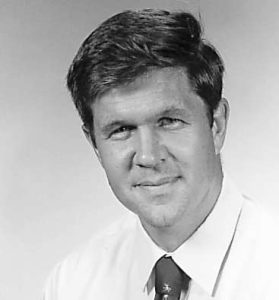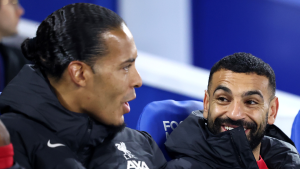
Even Donald Trump, with his pathological fixation on television ratings, appears incapable of reviving the hollowed-out husk that is LIV Golf.
As the US president, escaping the maelstrom unleashed by his tariff war, pitched up at his Doral course last weekend in a motorcade of buggies, his audience appeared supremely indifferent to what he was trying to sell. For on the first occasion that LIV went head to head with the PGA Tour in the TV schedule, thanks to a prime window for the Trump-hosted Miami event on Fox Sports, the result was nothing short of humiliating.
Just 484,000 viewers bothered to tune in, as against the 1.75 million who watched former Open champion Brian Harman’s low-key triumph at the Texas Open. There can be no sugar-coating such a trouncing – not when the final-round contenders in Miami included eight Masters champions, while the San Antonio leaderboard featured only one top-10 player in Maverick McNealy. On its first chance to implant itself in the American consciousness, LIV flunked the moment spectacularly.
In the end, fans are not easily fooled. For all the Saudi Arabian billions lavished on the LIV roster, there is no disguising that the rebel tour remains a soulless enterprise, a grotesque cash-grab whose only obvious distinctions are loud music and an entitlement to play in shorts.

Denuded of any narrative beyond personal enrichment, it is a project without public connection. Jon Rahm, Brooks Koepka, Phil Mickelson have 13 majors between them, and yet their arrival at Augusta this week stirs merely ennui, with the majority of spectators oblivious to their activities since last summer’s Open.
Rahm, having defected in 2023 for an estimated £450 million, collected a further £27 million in on-course earnings last year. The sums are so ludicrous, so unmoored from true market value – Rahm could easily walk down Fifth Avenue without anyone recognising him – that many have ceased caring. LIV’s supposed showpiece in Miami drew only fractionally more viewers on Fox, a mainstream channel, than it did for its 2024 season launch on The CW, a niche cable operation better known for its teen-centric soaps.
To Brandel Chamblee, the former PGA Tour winner turned leading pundit, LIV’s descent into obscurity is a fitting punishment for its lack of substance.
“LIV is dying a slow, costly death,” he says. “The players have sellers’ remorse. They want the meritocratic cachet that playing at the highest level confers, but they would rather have the money first and sue for the cachet, trying to blur the distinction between gift and reward. The audience sees right through them, and chooses to watch those who prefer to play for history and legacy.”
While the mercenary aspect is off-putting, so too is the dismal lack of depth in the LIV field. The “Majesticks” team, where Lee Westwood, Ian Poulter and Henrik Stenson have desperately sought to create a middle-aged buddy caper dynamic, posted a combined score in Miami of 50 over par for 54 holes. It was the type of total you might have expected from a monthly medal. But these were players competing in a £15.6 million tournament. Ian Poulter toiled to three rounds of 75 and still waltzed off with £115,000 in his pocket, his mediocrity amply remunerated because of the absence of a cut.

Only 12 LIV players have qualified for Augusta this year, the lowest number since the breakaway began in 2022. The majority relied on lifetime exemptions as past winners to do so, while Chile’s Joaquin Niemann received a special invitation, apparently to advance Augusta’s efforts to “develop interest in golf globally”.
By degrees, you can see the faultlines emerging. Koepka, perhaps the straightest shooter among the LIV recruits, seems especially unhappy. Pressed directly on the state of LIV, he says: “I think we all hoped it would have been a little bit further along, and that’s no secret.” He sounds like a man who has been sold a pup. While he might be richer beyond his wildest imaginings, the wider LIV experiment is going nowhere.
Its crushing in the ratings illustrates how people are tiring of its disingenuous rhetoric about growing the game. This is a scheme designed to achieve no such thing. Its sole purpose was to secure Saudi Arabia a seat at the top table. You could say this mission has been accomplished, given the colossal power of Yasir Al-Rumayyan, who manages to chair not only LIV but Newcastle United, Riyadh Air, state-owned oil giant Saudi Aramco and mining company Ma’aden, not to mention govern the Kingdom’s £725 billion Public Investment Fund (PIF). With golf serving as his own passion project, few could doubt that he has fulfilled his aim of causing maximum disruption in the shortest possible time.
Today, though, a tantalising question presents itself. For two years, the received wisdom has been that PIF and the PGA Tour would need to agree on a merger for the wider good of the game. But negotiations have stalled, with Rahm admitting: “It’s not happening any time soon.”
The impasse is only likely to endure, now that we have the clearest illustration of where LIV sits in the sport’s power structures, with the PGA Tour still by far the more potent TV draw. The more this pattern continues, the more confident the main tour will be of heading the renegades off at the pass. Far from bringing down the establishment, LIV is at risk of withering on the vine.

Even Donald Trump, with his pathological fixation on television ratings, appears incapable of reviving the hollowed-out husk that is LIV Golf.
As the US president, escaping the maelstrom unleashed by his tariff war, pitched up at his Doral course last weekend in a motorcade of buggies, his audience appeared supremely indifferent to what he was trying to sell. For on the first occasion that LIV went head to head with the PGA Tour in the TV schedule, thanks to a prime window for the Trump-hosted Miami event on Fox Sports, the result was nothing short of humiliating.
Just 484,000 viewers bothered to tune in, as against the 1.75 million who watched former Open champion Brian Harman’s low-key triumph at the Texas Open. There can be no sugar-coating such a trouncing – not when the final-round contenders in Miami included eight Masters champions, while the San Antonio leaderboard featured only one top-10 player in Maverick McNealy. On its first chance to implant itself in the American consciousness, LIV flunked the moment spectacularly.
In the end, fans are not easily fooled. For all the Saudi Arabian billions lavished on the LIV roster, there is no disguising that the rebel tour remains a soulless enterprise, a grotesque cash-grab whose only obvious distinctions are loud music and an entitlement to play in shorts.

Denuded of any narrative beyond personal enrichment, it is a project without public connection. Jon Rahm, Brooks Koepka, Phil Mickelson have 13 majors between them, and yet their arrival at Augusta this week stirs merely ennui, with the majority of spectators oblivious to their activities since last summer’s Open.
Rahm, having defected in 2023 for an estimated £450 million, collected a further £27 million in on-course earnings last year. The sums are so ludicrous, so unmoored from true market value – Rahm could easily walk down Fifth Avenue without anyone recognising him – that many have ceased caring. LIV’s supposed showpiece in Miami drew only fractionally more viewers on Fox, a mainstream channel, than it did for its 2024 season launch on The CW, a niche cable operation better known for its teen-centric soaps.
To Brandel Chamblee, the former PGA Tour winner turned leading pundit, LIV’s descent into obscurity is a fitting punishment for its lack of substance.
“LIV is dying a slow, costly death,” he says. “The players have sellers’ remorse. They want the meritocratic cachet that playing at the highest level confers, but they would rather have the money first and sue for the cachet, trying to blur the distinction between gift and reward. The audience sees right through them, and chooses to watch those who prefer to play for history and legacy.”
While the mercenary aspect is off-putting, so too is the dismal lack of depth in the LIV field. The “Majesticks” team, where Lee Westwood, Ian Poulter and Henrik Stenson have desperately sought to create a middle-aged buddy caper dynamic, posted a combined score in Miami of 50 over par for 54 holes. It was the type of total you might have expected from a monthly medal. But these were players competing in a £15.6 million tournament. Ian Poulter toiled to three rounds of 75 and still waltzed off with £115,000 in his pocket, his mediocrity amply remunerated because of the absence of a cut.

Only 12 LIV players have qualified for Augusta this year, the lowest number since the breakaway began in 2022. The majority relied on lifetime exemptions as past winners to do so, while Chile’s Joaquin Niemann received a special invitation, apparently to advance Augusta’s efforts to “develop interest in golf globally”.
By degrees, you can see the faultlines emerging. Koepka, perhaps the straightest shooter among the LIV recruits, seems especially unhappy. Pressed directly on the state of LIV, he says: “I think we all hoped it would have been a little bit further along, and that’s no secret.” He sounds like a man who has been sold a pup. While he might be richer beyond his wildest imaginings, the wider LIV experiment is going nowhere.
Its crushing in the ratings illustrates how people are tiring of its disingenuous rhetoric about growing the game. This is a scheme designed to achieve no such thing. Its sole purpose was to secure Saudi Arabia a seat at the top table. You could say this mission has been accomplished, given the colossal power of Yasir Al-Rumayyan, who manages to chair not only LIV but Newcastle United, Riyadh Air, state-owned oil giant Saudi Aramco and mining company Ma’aden, not to mention govern the Kingdom’s £725 billion Public Investment Fund (PIF). With golf serving as his own passion project, few could doubt that he has fulfilled his aim of causing maximum disruption in the shortest possible time.
Today, though, a tantalising question presents itself. For two years, the received wisdom has been that PIF and the PGA Tour would need to agree on a merger for the wider good of the game. But negotiations have stalled, with Rahm admitting: “It’s not happening any time soon.”
The impasse is only likely to endure, now that we have the clearest illustration of where LIV sits in the sport’s power structures, with the PGA Tour still by far the more potent TV draw. The more this pattern continues, the more confident the main tour will be of heading the renegades off at the pass. Far from bringing down the establishment, LIV is at risk of withering on the vine.











